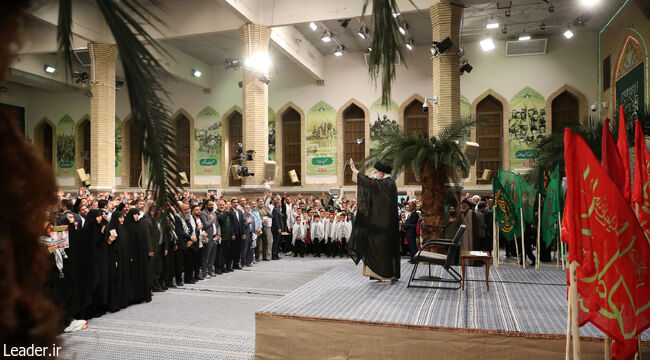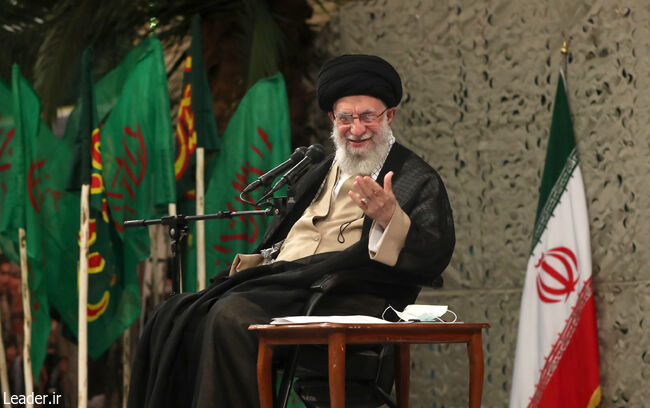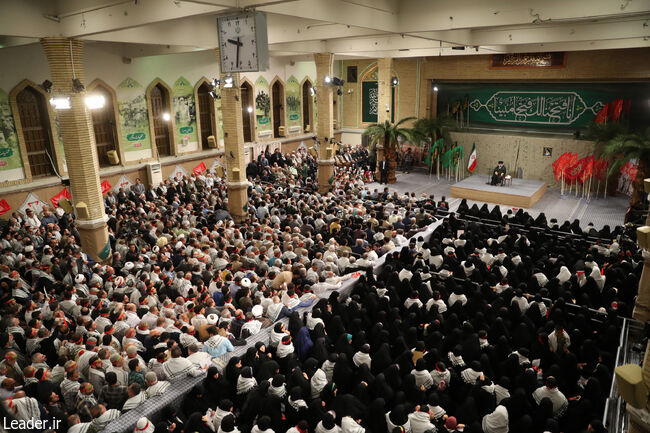The Leader of the Islamic Revolution, His Eminence Ayatollah Khamenei, welcomed thousands of Holy Defence front-line forces and activists, as well as the families of martyrs, artists, writers, and pioneers, in the morning of Wednesday, 20th September 2023, at the Imam Khomeini Hussainiya. He highlighted various aspects of the significance of the Holy Defence and the remarkable achievements of the resilient Iranian people. His Eminence stressed that the preservation of national unity, the revelation of the immense capabilities of the Iranian people, the expansion of the nation's non-geographical boundaries, and the promotion and solidification of the concept and culture of resistance, both domestically and globally were among the most notable outcomes of the collective defence of the Iranian people against the arrogant international front and the malicious Saddam regime. Furthermore, His Eminence emphasised that the emergence of young talents and the display of strength and initiative by the country's youth during the Holy Defence period demonstrated their enduring capability to resolve all the nation's challenges.
The Leader of the Islamic Revolution described the Holy Defence period as a prominent and pivotal chapter in the history of the revolution. He stressed the importance of understanding its greatness, noting that all major world powers stood against the Islamic Republic of Iran, which stood alone during that war. He added, "So far, we have been unable to fully understand the intricate details of the magnificent tableau of the Holy Defence, adorned with inscriptions and colours, and as a result, provide a comprehensive definition of it."
He continued asking, "What did we defend in the Holy Defence? We must grasp this moment and important event and pass it on to future generations. I am confident that if our successive generations learn the significant and purposeful aspects of the Holy Defence and understand how the Iranian people reached the platform of victory and stand there strongly during this significant event, great lessons will be drawn from this knowledge."
Ayatollah Imam Khamenei emphasised that during the Holy Defence, they defended the Islamic Revolution and the Islamic Republic, which resulted from the Islamic Revolution. They also defended the territorial integrity of the country. He said, "The other side attacked these three things. Of course, the enemy's main objective was not about targeting territorial integrity but the revolution. They wanted to suppress this unique, great, and crucial revolution that had taken place in Iran thanks to the sacrifices of the people."
He added, "There is a significant distinction between waging a war to alter the borders between two countries and a war aimed at destroying the identity of the people. Most wars are territorial and seek to gain control of lands, but wars take on a different dimension when the objective is to target the identity of the people, their homeland, and the achievements resulting from their sacrifices. This event is different from those situations. The matter was not just about altering geographical borders, although that was also important, but the significance of this issue cannot be compared to those."
The Leader of the Islamic Revolution emphasised the need to reflect and contemplate the outcomes, achievements, and reasons behind the Holy Defence. He added, "What are the results and accomplishments of the Holy Defence? We must ponder and study what the defence was about. Who was the defence against? Thirdly, who initiated the defence? And fourthly, what were the outcomes of this defence?"
He went on to mention that the Islamic Republic stands for religious democracy and that the core issue for the enemy is the very existence of the Islamic Republic. He continued, "In the war with Iraq against Iran, it wasn't just about altering geographical boundaries; they were targeting the identity of the people."
The Leader stressed the need to understand the magnitude of the Holy Defence event, saying, "We have achieved a lot, but I believe there is still a vast scope for work. Until now, we have been unable to fully comprehend the intricate details of this magnificent tableau, richly adorned with inscriptions and colours, and thus, to define it."
Ayatollah Khamenei added, "The greatness of this event can be seen from multiple angles. One of them is, what were we defending? From another perspective, it was about whom we were defending against and who had attacked, making it necessary to defend against them. The third angle is who initiated this defence. The fourth angle is what the results and accomplishments of this defence were, and what was the outcome of this defence?"
He continued, "The main instigator was the United States, and the French provided Iraq with advanced military equipment. Moreover, the Eastern Bloc and the former Soviet Union supplied Iraq with all the ground and air capabilities it needed. However, no one assisted us in the (imposed) war. Even the facilities and weapons we wanted to purchase, we were rarely able to obtain them, and only in partial cases."
He added, "The Holy Defence was a platform for the collective presence of the people. The sources of strength were the mosques, universities, schools, and barracks.” He emphasised how it is essential to undertake artistic endeavours to promote the values of the Holy Defence. He said, "If we consider who the aggressors were during the Holy Defence phase, the greatness and importance of the Holy Defence become evident."
His eminence continued, "On that day, all the major world powers united and participated in this assault on the Islamic Republic and the Islamic Revolution. America in one way, different European countries in their own ways, and the Eastern Bloc led by the Soviet Union in another."
Ayatollah Imam Khamenei also remarked, "It has been said that the Americans were the primary instigators of Saddam's attack on Iran, and during the war, they provided the most crucial assistance, which was intelligence support. They continuously and consecutively monitored the locations of our forces on aerial maps and supplied Saddam with this information, in addition to tactical strategies."
He noted that the Europeans and the French supplied Saddam with state-of-the-art aerial equipment, fighter jets, and helicopters. He said, "The Germans provided the facilities for the production of chemical weapons that caused many disasters in Iran and even in Iraq itself, including in Halabja. The Eastern Bloc and the former Soviet Union, as well as Eastern European countries, provided Saddam with all the ground and air facilities he desired, giving him everything he needed. The missiles were costly, so they equipped his artillery to allow him to strike Tehran without spending much."
He added, "Arab states in our region provided him with immeasurable sums of money. They offered financial support and transportation routes. The southern part of the Persian Gulf was always a constant flow of trucks and heavy machinery carrying supplies to Iraq. I mean to say, everyone helped him, everyone! They were the attackers."
He emphasised, "The Holy Defence expanded the boundaries of resistance. We did not seek to expand geographical borders, but the title of resistance was introduced to the world and pushed forward by the Holy Defence.” He considered the armed forces an essential element of every society. He stated, "The armed forces are a provider of security, and one of the things the enemy relies on is undermining the values of the armed forces."
The Leader of the Islamic Revolution pointed out that the Islamic Republic and the Iranian people stood alone in the battle against the "Axis of Arrogance, Saddam, and Arab states in the region." He said, "The people emerged victorious on such an uneven battlefield and displayed their greatness and glory."
In explaining the third dimension of the greatness of the Holy Defence, he highlighted the participation of all segments of the population in that unique narrative and added, "On the surface, it may appear that the Iranian armed forces, including the Revolutionary Guard, the regular army, and the popular mobilisation, are the ones who repel invasions, just as is the case everywhere in the world. However, the essence of that defence was radically distinct from other wars."
He regarded the leadership of Imam Khomeini over the Holy Defence effort, with his moral character, knowledge, wisdom, and spiritual clarity, as a significant factor among these differences. He said, "The impact of the words stemming from the spirituality of Imam Khomeini and his warm influence during various occasions, including the liberation of the city of Panjeh (in Kurdistan province, western Iran) from the hands of terrorist groups and breaking the siege of Abadan (in Khuzestan province, southern Iran), had a profound effect on the fronts."
The Leader of the Islamic Revolution considered the religious fervour of the defenders to be the distinguishing factor between the Holy Defence and other wars. He said, "Turning to God and upholding moral values on the battlefronts, along with the general public's support for the combatants and the resilience of mothers, fathers, and the wives of martyrs, transformed the Holy Defence and the front lines into places of worship."
He also regarded the participation of all social strata and the conversion of mosques, universities, schools, and universities into centres for mobilisation and the dispatch of forces as other aspects of the religious dimension of the Holy Defence. He added, "Numerous captivating works of art can be produced in these domains."
In the fourth part of describing the greatness of the Holy Defence, the Supreme Leader of the Islamic Revolution spoke about the numerous and unique achievements of the people and the nation. He considered preserving the territorial integrity and not allowing even a single part of the beloved Iran to be separated as one of these achievements. He said, "Highlighting the great potential of the people is indeed one of the most important achievements of the Holy Defence. In reality, the people discovered their greatness and capabilities in the mirror of the Holy Defence and became certain of it because all the enemies conspired against them for eight years, yet they couldn't commit any folly."
He regarded the flourishing talents of thousands of young people as another fascinating fact in the Holy Defence and said, "Relying on these matters, we confidently affirm that the country's youth are capable of solving all problems."
The strengthening of Iran was another result of the eight years of the imposed war, as emphasised by the Supreme Leader of the Islamic Revolution. He stated, "The country has been significantly strengthened against potential attacks due to the comprehensive heroic defence. As we have seen, the enemies have repeatedly claimed that the military option is on the table, but this option has not been moved from the table because they knew the Iranian people from the war, and they were aware that they might initiate action, but it is our people who would finish that action."
He emphasised the emergence of wide-ranging talents, intelligence, initiative, innovation, and the ability to overcome the world's arrogance during the eight years of war. He added, "When these national capabilities shine through, they increase hope and vitality for achieving victory and progress in other domains."
Expanding Iran's non-geographical boundaries, including intellectual and cognitive frontiers, represented another achievement highlighted by Ayatollah Khamenei. He said, "As a result of this highly significant success, the global concept of resistance in regions like Palestine, Syria, Iraq, and beyond has been formed and crystallised. The actions of the Iranian people have now become a model for other nations in various regions across Asia, Africa, and Latin America."
He described the emergence and consolidation of a self-confidence culture as the miracle of the Sacred Defence. He stated, "The world's arrogant powers covet our significant region for various reasons. Therefore, the moral presence of the Islamic Republic of Iran and the rise of the culture of resistance have caused the United States and others to cry out because the resistance of the people has thwarted their utilitarian interests."
Ayatollah Imam Khamenei depicted the growth and strength of the idea of resistance within the country due to the years of the Sacred Defence. He said, "In the three decades following the war, we witnessed various attacks and seditions, all of which failed due to the foundation of the culture of resistance within the people."
In summarising his discussion about the dimensions of the greatness of the Sacred Defence, he stated, "The Sacred Defence has a rightful place in our country, but some cast doubts upon it and attempt to undermine its greatness through distortion or explicit falsehoods. Therefore, it is necessary to clarify and present the facts about the Sacred Defence, which has shaped history."
He considered that the potential and human elements provide a suitable platform for creating engaging artistic works, including films, books, and good novels about the Sacred Defence. He emphasised, "We must be diligent in not losing sight of the goal in such works."
In the final part of his speech, he addressed some points related to the armed forces, stating that the armed forces are fundamental pillars of any society. He said, "One of the enemy's objectives is to harm the value, honour, and dignity of the armed forces."
He pointed out the importance of honouring the armed forces and added, "The security of society and the nation is everything, and without it, there is no economy or peace. Therefore, we should care for the armed forces in various ways, appreciate their presence, and respect their efforts."
He emphasised that the logic of strength in Islam, unlike the West, doesn't seek to dominate or humiliate others. He said, "Power does not contradict compassionate behaviour and good words. The more your self-reliant and legitimate power increases, the more your humility towards people and your orientation towards Allah, the Almighty, should also increase."
In conclusion, he reminded of the promise of divine assistance when there is a divine intention in the work. He said, "As long as we work for the sake of God and with God in mind, whether we understand it or not, God will certainly help us."
Prior to the speech by the Supreme Leader of the Islamic Revolution, six activists and researchers from various fields of the Sacred Defence spoke. They were Dr Zahra Barzkar, Dr Meitham Salehi, Dr Samiya Boroujerdi, Saeed Alamyian, Frank Jamsheedi, and Hamid Parsa. They expressed some points regarding the importance of using the defence model to solve the country's problems, promoting and spreading the culture of sacrifice and the lives of martyrs, protecting the Iranian Islamic way of life, explaining values to the younger generation in a technical manner, and the need for a comprehensive scientific plan for the Sacred Defence.
Additionally, Brigadier Bahman Karkar, the head of the Foundation for the Preservation of the Heritage and Values of the Sacred Defence, presented a report on the activities and programs of this institution. This included honouring veterans of the Sacred Defence and expanding the scope of models for the "march towards progress."



